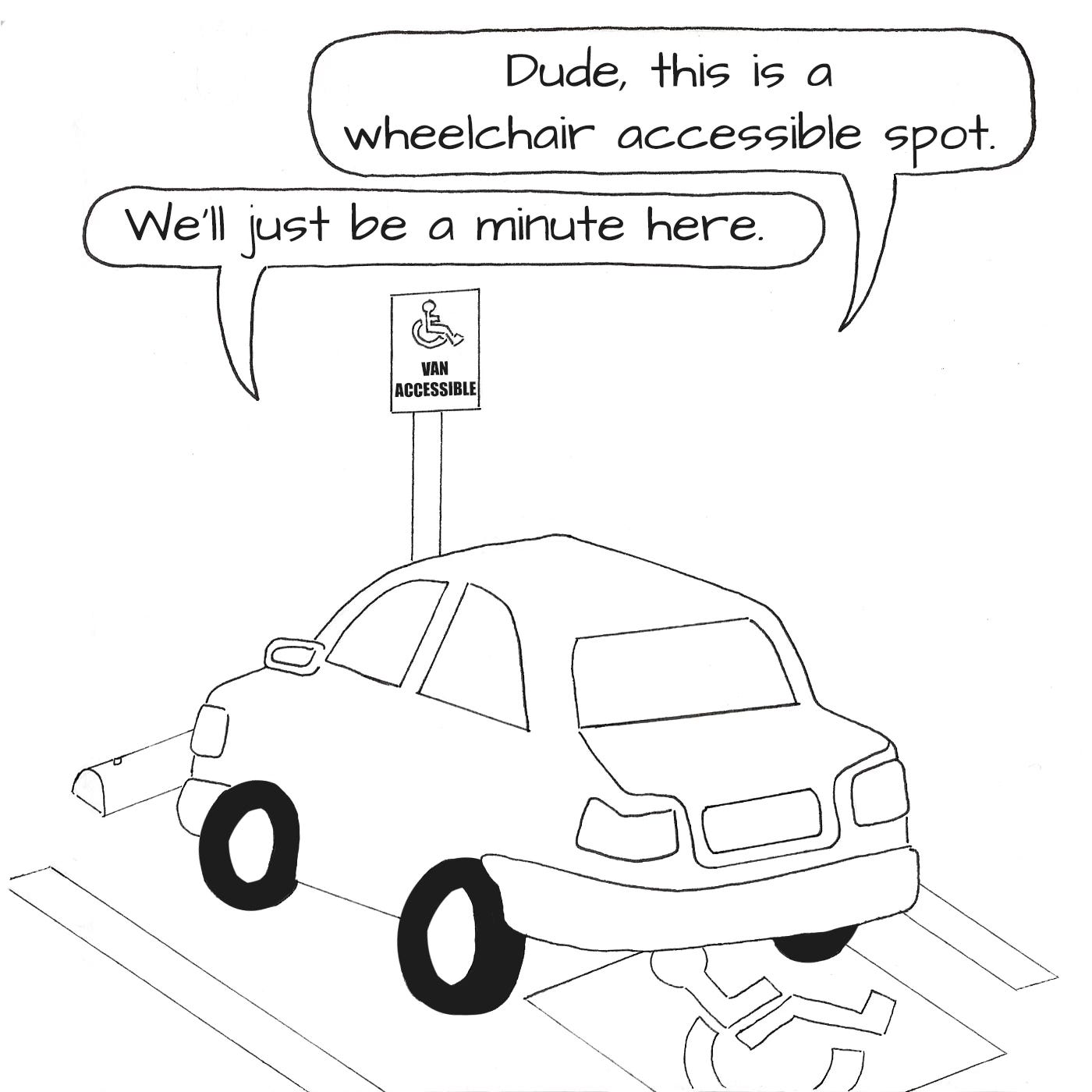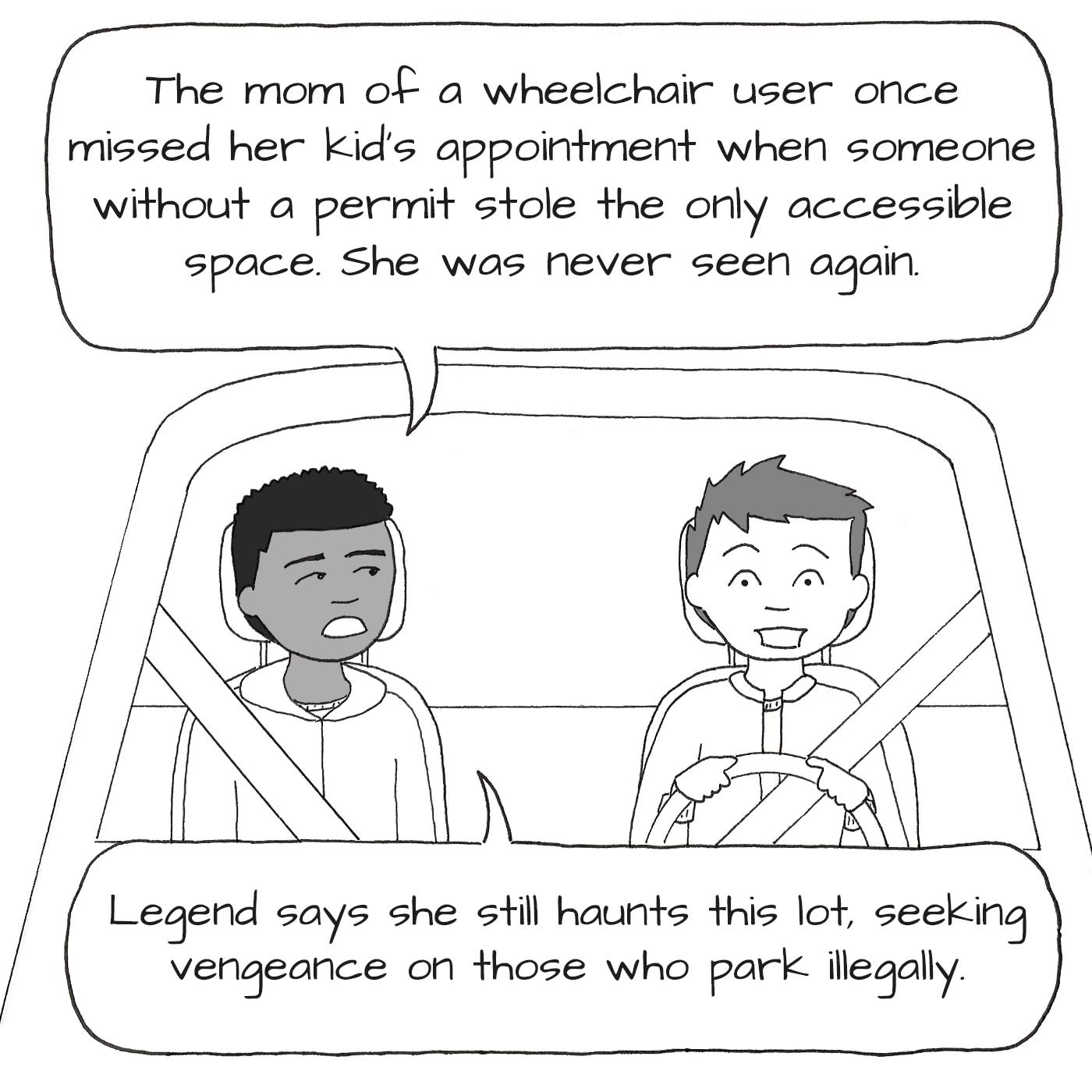The Blue Space Banshee Haunts Parking Space Cheaters
Plus: The theory behind decimating federal special education jobs; Record spending in Idaho still not enough to bring schools into ADA compliance; Inspired cousin designs innovative disability housing
This month, Lenore Eklund is serving up a spooky edition of Where is the Manual For This?! Let’s start spreading the ghost story of the Blue Space Banshee throughout our communities! Perhaps the threat from a supernatural being will have more success than a moral failing and legal consequences.
Medical Motherhood’s news round up
Snippets of news and opinion from outlets around the world. Click the links for the full story.
• From The 19th: “Trump’s attempt to gut special education office has some conservative parents on edge”
[…]More than 7.3 million children in all 50 states rely on special education services, which are partially funded and enforced by the federal government.
[…]A federal district court judge in Northern California on Wednesday granted an emergency order to temporarily pause the mass layoffs that occurred throughout the federal government. If the gutting of the Office of Special Education and Rehabilitative Services, or OSERS, proceeds, Town and other disability advocates said there is no way the Department of Education can continue to fulfill its responsibilities to enforce the Individuals with Disabilities Education Act. The act — known by its acronym, IDEA — guarantees students with disabilities the same right to public education as students without disabilities.
[…]Reducing the Department of Education has long been a stated goal for some on the right.
“Republicans generally are seeing education as mostly a state and local project, and that the increase in the federalization of education programs and dollars is not a step in the right direction,” said Rachel Barkley, director of Able Americans.
Able Americans is one of the only conservative think tank projects dedicated entirely to disability policy. It is housed within the National Center for Public Policy Research, one of the many conservative organizations that contributed to the development of Project 2025.
But Barkley said that this does not mean a lack of support among conservatives for special education services. She pointed to President Trump’s previous fiscal year 2026 discretionary budget request. While it proposes zeroing out or reducing many federal programs’ funding, that was not the case for special education funding.
“The President’s budget is a kind of ideological statement — a wish list that never gets enacted. His budget level funded IDEA, kept it at the same level, despite other programs having a 15% drop,” Barkley said. While she and some other conservatives oppose having a Department of Education, she says they do not oppose support for disabled students.[…]
• From ProPublica: “Disabled Idaho Students Lack Access to Playgrounds and Lunchrooms. Historic $2 Billion Funding Will Do Little to Help.”
At an elementary school in southwest Boise, Idaho, in the fall of 2020, children in pre-K went to their recess on the playground, laughing and climbing ladders to reach the slide. One 3-year-old boy sat on the sidelines.
The loose woodchips prevented the boy, who uses a wheelchair, from joining his classmates. There were no swings he could use or textured panels or blocks he could play with. The only student in the class who used a medical stroller, he was relegated to watching his classmates play as a staff member stood with him.
[…]The playgrounds at Silver Sage Elementary excluded children like Schlink’s son, even though they had been updated by the West Ada School District in 2016 — decades after the Americans with Disabilities Act required new construction to be fully accessible to all students.
The Schlinks reached out to the school asking for help. The district told them in 2022 that improvements were in the pipeline, the boy’s mom, Stephanie Schlink, said. But at some point, communication stalled, she said. Another year passed.
“I finally was just like, ‘OK, they’re not going to do anything,’” Stephanie Schlink told the Idaho Statesman and ProPublica. “‘F this, I’m going hard.’” In 2023, she filed a complaint with the Office for Civil Rights within the U.S. Department of Education, the agency that investigates complaints over discrimination against people with disabilities in schools.
[…]Like Silver Sage Elementary, many schools in Idaho struggle to meet the standards laid out under the law. In 2023, nearly 70 superintendents told the Statesman and ProPublica that accessibility for people with disabilities was a concern in at least one of their buildings. In many cases, school leaders said, they would need major renovations to make those schools inclusive to students with disabilities.
Over a year after the state approved $2 billion to help schools repair and replace their aging buildings, around three dozen superintendents told the Statesman and ProPublica that their buildings are still not fully accessible, while others said they had workarounds that were not ideal. Many pointed to funding as a continued challenge.
[…]“The cost of retrofitting our current buildings to full compliance is prohibitive, if not impossible, and that reality does limit our ability to provide every service in every building,” [Pocatello High School spokesperson Courtney] Fisher said in an email. “School districts across Idaho — and across the nation — are grappling with the same issue: aging facilities that were built long before ADA requirements, limited resources to modernize them, and the significant costs associated with comprehensive retrofits.”[…]
• From PBS News Hour: “Brief but Spectacular: Micaela Connery, co-founder of The Kelsey.”
[…]Micaela Connery, Co-Founder And CEO, The Kelsey: Kelsey was my first cousin and she lived with multiple significant disabilities. […]When Kelsey was in her 20s, both her sisters had moved out and she made it very clear that she too was interested in moving out on her own. And there were really no options available to her. I at first thought that Kelsey’s needs were unique to her and learned very quickly that actually, no, what Kelsey experienced was an example of a much larger issue where disabled people had little to no options when it came to housing, and the solutions weren’t available in any community, not just in the community where she was.
The Kelsey builds and advocates for housing that is disability-forward, housing that’s affordable, accessible and inclusive. We also then go upstream and say, how do we change the systems, field resources and policies so that the kinds of communities we build are not just made by The Kelsey, but are possible to be created everywhere?
Historically, the housing that has been provided to people with disabilities has been in institutional and facility-based settings, often where services and daily life are prescribed to all individuals with not a lot of choice and control. We really ask people, if you could create any kind of housing intervention, what would that be?[…]
Medical Motherhood brings you quality news and information each Sunday for raising disabled and neurodivergent children. Get it delivered to your inbox each week or give a gift subscription. Subscriptions are free, with optional tiers of support. Our paid subscribers make this work possible! Not ready to subscribe but like what you read here? Buy me a coffee.
Follow Medical Motherhood on Facebook, Bluesky, X, TikTok, Instagram or Pinterest. Visit the Medical Motherhood merchandise store.






